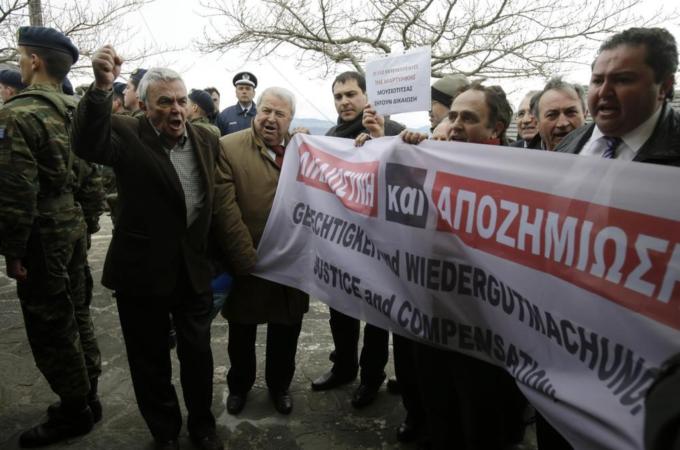Greece pressures Germany on WWII reparations |
|
|
Struggling through a continued economic downturn, Greece has reopened the debate on German reparations.
John Psaropoulos
Last updated: 26 Apr 2014 10:21
|

Germany holds that reparations issues were settled in September 1990 [AP]
|
|
Athens, Greece - On June 10,
1944, three Wehrmacht units converged on the village of Distomo in
Nazi-occupied central Greece. They had received reports of black market
activity in the area - a hanging offence under the Nazis, who stockpiled
food to supply their armies overseas, leaving the local population
strictly rationed. Instead of smugglers they found a dozen resistance
fighters and rounded them up. "A representative ran off and warned the resistance that was encamped three or four kilometres from the village," says Thanos Bouras, who was then 20 years old. "The resistance attacked, and they mortally wounded the German commander. A woman brought him some water. He thanked her, and said: 'The entire village [is] kaput, but don't harm this woman.'" What followed was one of the worst Nazi atrocities in Greece during their three-and-a-half-year occupation. Angelos Kastritis, who was eight, remembers the Germans going house to house, bashing down doors and spraying interiors with machine-gun fire. Kastritis' mother had told him and his father to make themselves scarce while she stayed home with her in-laws, believing that women and the elderly would not be harmed. "When I returned I first saw my grandfather. The back of his head was gone and his brains had been splattered against a staircase. My grandmother was seated next to him [dead]. Inside the house I saw my mother… They had killed her execution-style, from behind." Sture Linner, the Swedish head of the Red Cross in Greece, arrived in Distomo three days later. He described what he saw in his autobiography, My Odyssey, "For hundreds of yards along the road, human bodies were hanging from every tree, pierced with bayonets - some were still alive. In the village… hundreds of dead bodies of people of all ages, from elderly to newborns, were strewn around on the dirt. Several women were slaughtered with bayonets, their wombs torn apart and their breasts severed …" Seven percent of the Greek population at the time of the war - over half a million people - was wiped out. Four-fifths of those were civilians and were killed in mass executions and punitive massacres like that at Distomo. But the single biggest killer was starvation, stemming from Germany's disastrous management of the Greek economy. Greece lost 97 percent of its exports. Agricultural production fell; infrastructure was systematically destroyed. A year into the occupation, Germany was so worried about a collapse of civil society that it let Britain and the Red Cross distribute food and aid...... more see: http://www.aljazeera.com/indepth/features/2014/04/greece-pressures-germany-wwii-reparations-201442683740820822.html |
Saturday, April 26, 2014
Subscribe to:
Post Comments (Atom)




No comments:
Post a Comment